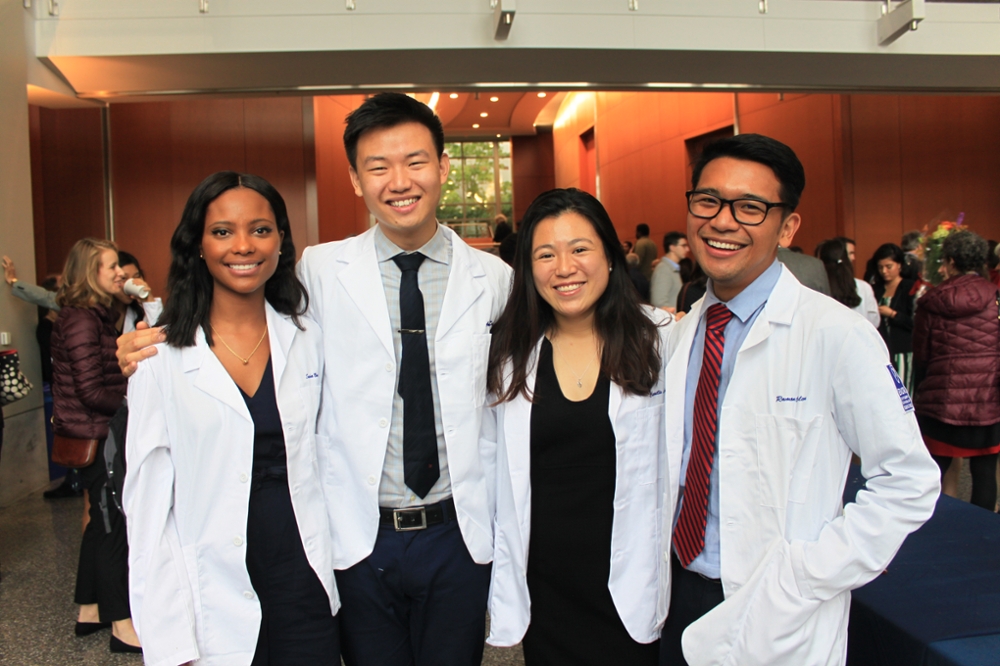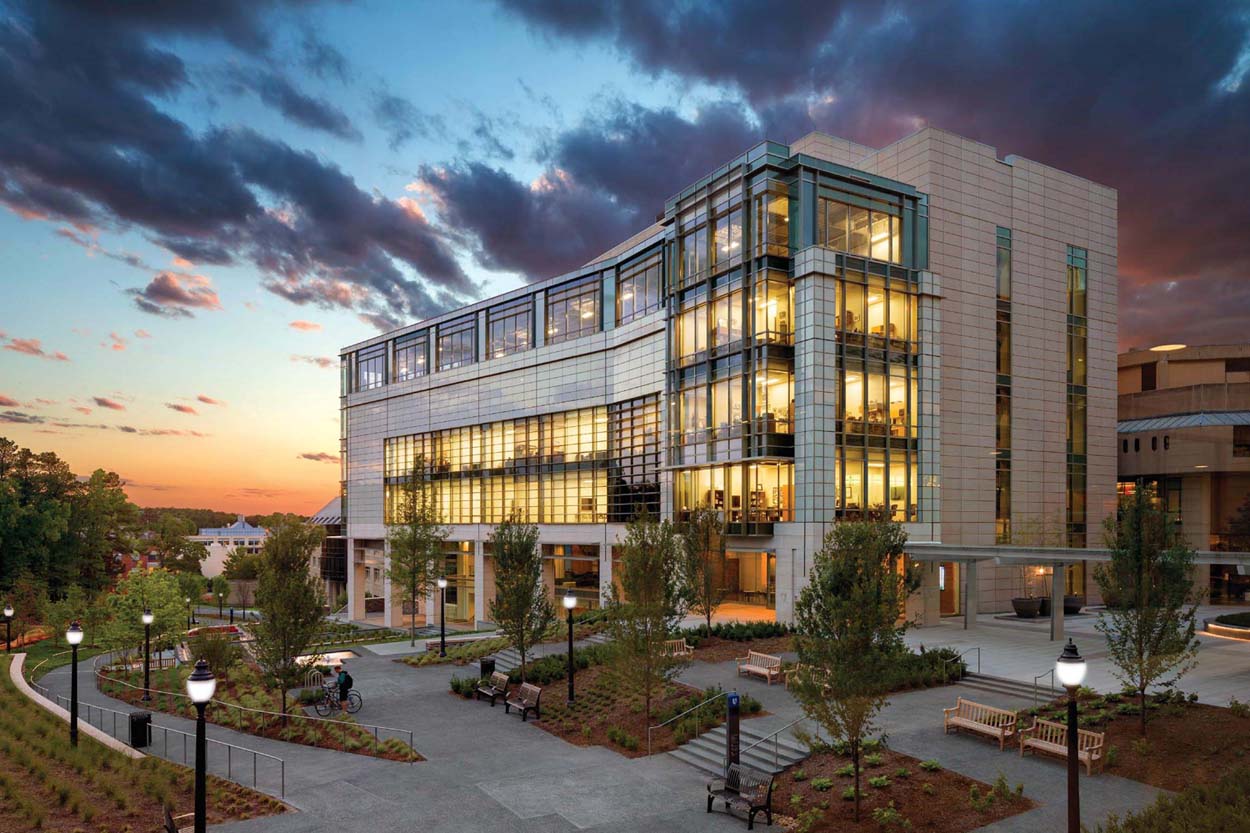The Emory School of Medicine is a high-ranking institution for research and patient care and is one of the most diverse medical schools in the country. Its campus is located in the historic, pleasant neighborhood of Druid Hills, Atlanta, Georgia, and attracts researchers and students from all over the world.
So, what does it take to get into Emory Medical School? This article organizes all the key information you need to know to help you move forward with your application. If you plan to apply to Emory Medical School, consider bookmarking this page to reference during your application process.
Be an Informed Applicant
You probably already know how competitive it is to get into medical school. Emory Medical School, with an acceptance rate below 4%, is no exception.
There’s a lot more than academic requirements to keep in mind. Your personal statement and essays are carefully reviewed by admissions. What you write is sometimes your only chance to make a compelling case for yourself as a future student.
We recommend familiarizing yourself with the school’s background, selection factors, medical programs, and institutional identity. Having a well-rounded picture of the school will give you a clearer understanding of what Emory is looking for and help you focus the information in your application.
This article covers:
- Emory Medical School’s Rankings and Institutional Identity (Why Emory?)
- Medical Programs at Emory School of Medicine
- Selection Factors: What Emory Looks for in a Candidate
- Academic Requirements (GPA, MCAT Scores, Required Coursework)
- Emory School of Medicine Acceptance Rate, Class Profile, and More
- Emory Medical School Tuition and Cost of Attendance
- AMCAS Primary Application and Emory Medical School Secondary Application
- Emory Secondary Application: Essay Prompts, Sample Answers, and Advice
- Medical School Admissions Consulting
- Voluntary Healthcare Internships Abroad
Personalized Help
Applying to medical schools requires research, organization, and attention to detail. International Medical Aid’s medical school admissions consulting provides comprehensive guidance from experts in the field of medicine of education. We handle the details, such as application reviews and interview prep, as well as work with you to develop an overall, personalized strategy that hits your goals and meets your needs.
Why Emory Medical School?
Alumni of Emory Medical School have traveled to space, received the Medal of Honor, and feature in the Georgia Writers Hall of Fame. And, of course, hold a wide array of positions in top medical institutions across the country.
Emory is one of the top clinical research institutions in the southeast and boasts an impressive network of training sites, including hospitals, clinics, and other healthcare and healthcare-related facilities in the Atlanta area. In 2021, the School of Medicine received $479.5 million in funding from the National Institutes of Health (NIH).
According to Emory’s website, the school is “best known for […] work in infectious disease, brain health, heart disease, cancer, transplantation, orthopedics, pediatrics, renal disease, ophthalmology, and geriatrics.”
Robust anti-racism resources, all-gender bathrooms, the school’s notable Implicit-Unconscious Bias Education Program, and more demonstrate the school’s commitment to diverse, inclusive healthcare communities. In the spirit of Atlanta’s rich civil rights history, Emory School of Medicine’s African American history is well-documented and celebrated by the institution.
Additionally, applicants are attracted by Emory Medical School’s emphasis on providing mental, emotional, and physical support to its medical students. The school offers a slew of programs aimed at combatting medical school burnout. Personal counseling services, free Lyft rides for students too tired to travel home, fitness facilities, and lactation rooms are some of the ways Emory provides students with resources to remain healthy, happy, and productive.
Finally, Emory Medical School offers a straightforward and effective curriculum that provides students with plenty of opportunities to pursue concentrations and personal interests.
Emory School of Medicine School Rankings 2022
Emory University ranks 21st in top universities in America, and its School of Medicine places as follows:
- #22 in Best Medical Schools: Research
- #36 in Best Medical Schools: Primary Care
- #18 in NIH Funding
- #26 in Most Diverse Medical Schools
- #97 in Most Graduates Serving in Medically Underserved Areas
MD Programs at Emory Medical School
Here are the MD programs currently offered at Emory Medical School:
- Doctor of Medicine (traditional MD program)
- MD/PhD in Research
- MD/MA in Bioethics
- MD/MPH in Public Health
- MD/MBA in Business
- MD/MSCR in Clinical Research
4-Year MD Program
Here’s an overview of the four-year MD curriculum at Emory School of Medicine. Highlights of the MD program include early patient engagement, long-term small learning groups, and a distraction-free 3rd-year research project.
Emory’s MD program is comprised of four phrases:
- Foundations of Medicine (18 months)
- Application of Medical Sciences (12 months)
- Discovery (5 months)
- Translation of Medical Sciences (9 months)
Year 1: Foundations of Medicine
Week on the Wards – The 1st week is spent shadowing clinicians and faculty.
Healthy Human – This is a 4-month course on healthy human physiology.
Essentials of Patient Care (EPC) – Students meet twice a week in small groups to discuss doctoring ethics, professionalism, cultural competency, and other important topics. Additionally, this encourages faculty and students to form close relationships early in their MD journey.
Community Learning and Social Medicine (CLSM) – Community service and group reflection are the foundational components of CLSM. Students choose to focus on elderly, disabled, poor, or immigrant/refugee populations, and work to serve them in partnership with 50+ community organizations.
Outpatient Clinical Experience (OPEX) – This program begins 4 months into year 1. Students serve and shadow healthcare teams every other day, in preparation for 2nd-year rotations.
Human Disease – This course begins in month 5. Here, students study human disease and attend the anatomy (dissection) lab. This course is structured by organ-based systems.
Year 2: Foundations of Medicine/Application of Medical Sciences
In the 1st half of year 2, students complete the Foundations of Medicine phase described above, as well as attend their sophomore elective.
USMLE Step 1 – After completing the Foundations of Medicine phase, a 2-month study period for the United States Medical Licensing Exam takes place.
Rotations – Students begin rotations in the following fields:
- Surgery
- Medicine
- Pediatrics
- Psychiatry
- Neurology
- Obstetrics & Gynecology
- Radiology
- Primary Care
- Dermatology
- Ophthalmology
- Palliative Care
- Anesthesiology
Rotations take place in the Atlanta area at Emory and its affiliated facilities:
- Grady Memorial Hospital
- Emory University Hospital
- Emory University Hospital Midtown
- Children’s Healthcare of Atlanta at Egleston
- Children’s Healthcare of Atlanta at Hughes Spalding
- Wesley Woods Center and Geriatric Care Hospital
- Atlanta Veterans Affairs Medical Center
- The Emory Clinics
- Other clinical sites in the Atlanta area
Small group meetings – Students continue to meet with their groups from year 1 to discuss their rotations experience and further develop their professional values.
Year 3: Application of Medical Sciences/Discovery
In the 1st half of year 3, students complete the Application of Medical Sciences phase, continuing their rotations as clerkships. Then, a month-long USMLE study break takes place in preparation for the CS and CK exams.
Discovery – In the final half of year 3, students give their undivided attention to conducting a research project under the tutelage of an Emory faculty member. The program asks for scientific research in the field of medicine but encourages students to explore their diverse interests. Past research projects have explored medicine in relation to literature, community development, education, and more.
Year 4: Translation of Medical Sciences
This year focuses on preparing MD students for residency. 4th-year rotations include:
- Emergency Medicine
- Critical Care Medicine (ICU)
- A sub-internship in Surgery, Medicine, or Pediatrics
The program ends with a month-long Capstone course. Workshops, lectures, discussions, and more prepare students to enter residency with a well-rounded skillset.
MD/PhD and Dual Degrees
The Emory Medical School offers a fair amount of dual degrees for MD students, as well as an MD/PhD in Research.
MD/PhD in Research
The MD/PhD program enrolls students in Emory Medical School and the Laney Graduate School (Georgia Tech). Accepted students complete the first 3 years of medical school and their USMLE exams before beginning the PhD track. This is an 8-year program for students in excellent academic standing to pursue research careers.
The MD/PhD program is quite competitive, with only 14 students admitted to Emory’s MD/PhD program in 2020-2021.
MD/MA in Bioethics
Students pursuing a dual degree in bioethics can expect to study a vast array of ethical issues with a focus on ethics in clinical practice. Bioethics incorporates the study of medicine, philosophy, public health, law, theology, and other related fields.
This degree’s Alumni are featured in journals and ethics committees across different medical fields, as well as occupying decision-making roles in important institutions, such as the Centers for Disease Control and Prevention and the Georgia Department of Public Health. Physicians also benefit from this degree by being better equipped to provide ethical care to patients.
Work on this degree replaces the Discovery phase in the MD program. The program takes 5 years to complete in full.
MD/MPH in Public Health
This dual degree is designed for future physicians interested in diagnosing communal health issues. International study is a common component of this program.
The coursework to satisfy the MPH in Public Health is taken at the Emory School of Public Health. The degree takes 5 years to complete and replaces the Discovery phase of the MD program.
MD/MBA in Business
Offered in collaboration with the Goizueta Business School, this dual degree provides future physicians with the business skills needed in healthcare organizations.
The MD/MBA takes 5-6 years to complete, requires 50 credit hours, 3 semesters in residency, and a directed study that involves business and medicine.
MD/MSCR in Clinical Research
The Master of Science in Clinical Research trains physicians in the analytic practices necessary to conduct scientific medical research. Students are encouraged to apply in their 3rd year of medical school and must demonstrate an understanding of the principles of clinical trials, evidence-based medicine, bioethics, and implementation science.
This dual degree takes 5 years to complete. Students begin the MSCR training after the 3rd year of medical school.
Residencies and Fellowships
Emory is one of the largest medical training institutions in the country. Emory and its affiliates offer the following programs for students to apply to once they complete their MD.
- Anesthesiology
- Anesthesiology Residency
- Cardiothoracic Anesthesiology
- Critical Care Medicine
- Obstetric
- Pain Medicine
- Pediatric
- Dermatology
- Dermatology Residency
- Micrographic Surgery and Dermatologic Oncology
- Emergency Medicine
- Emergency Medicine Residency
- Emergency Medical Services
- Medical Toxicology
- Family & Preventive Medicine
- Family Medicine Residency
- Preventive Medicine Residency
- Human Genetics
- Medical Biochemical Genetics
- Medical Genetics and Genomics
- Pediatrics/Medical Genetics and Genomics
- Medicine
- Adult Congenital Heart Disease
- Advanced Heart Failure & Transplant Cardiology
- Cardiovascular Disease
- Clinical Cardiac Electrophysiology
- Endocrinology, Diabetes, and Metabolism
- Gastroenterology
- Geriatric Medicine
- Hospice and Palliative Medicine
- Infectious Disease
- Internal Medicine-Psychiatry
- Interventional Cardiology
- Nephrology
- Pulmonary Disease and Critical Care
- Rheumatology
- Sleep Medicine
- Transitional Year
- Hematology and Medical Oncology
- Neurosurgery
- Neurological Surgery
- Neurology
- Neurology Residency
- Child Neurology
- Clinical Neurophysiology
- Epilepsy
- Vascular Neurology
- Neuromuscular Medicine
- Gynecology/Obstetrics
- Obstetrics and Gynecology Residency
- Female Pelvic Medicine & Reconstructive Surgery
- Maternal-Fetal Medicine
- Reproductive Endocrinology & Infertility
- Complex Family Planning
- Ophthalmology
- Orthopedics
- Hand Surgery
- Orthopedic Sports Medicine
- Orthopedic Surgery
- Otolaryngology
- Otolaryngology Residency
- Pediatric Otolaryngology
- Pathology & Laboratory Medicine
- Pathology Anatomic and Clinical Residency
- Blood Banking/Transfusion Medicine
- Cytopathology
- Dermatopathology
- Forensic Pathology
- Hematology (Pathology)
- Medical Microbiology
- Molecular Genetic Pathology
- Neuropathology
- Pediatric Pathology
- Selective Pathology (Gastro)
- Selective Pathology (Surgical)
- Selective Pathology (Gynecologic)
- Pediatrics
- Pediatrics Residency
- Allergy and Immunology
- Pediatric Cardiology
- Child Abuse Pediatrics
- Pediatric Critical Care Medicine
- Pediatric Emergency Medicine
- Pediatric Endocrinology
- Pediatric Gastroenterology
- Pediatric Hematology/Oncology
- Pediatric Infectious Diseases
- Pediatrics/Medical Genetics and Genomics
- Neonatal-Perinatal Medicine
- Pediatric Nephrology
- Pediatric Pulmonology
- Pediatric Rheumatology
- Pediatric Transplant Hepatology
- Pediatric Hospital Medicine
- Psychiatry & Behavioral Sciences
- Psychiatry Residency
- Addiction Psychiatry
- Child and Adolescent Psychiatry
- Consultation-Liaison Psychiatry
- Forensic Psychiatry
- Geriatric Psychiatry
- Internal Medicine-Psychiatry
- Radiology
- Diagnostic Radiology Residency
- Interventional Radiology-Integrated
- Neuroradiology
- Nuclear Medicine
- Nuclear Radiology
- Pediatric Radiology
- Interventional Radiology-Independent
- Radiation Oncology
- Radiation Oncology Residency
- Rehabilitation Medicine
- Physical Medicine and Rehabilitation Residency
- Pediatric Rehab Medicine
- Physical Medicine/Rehab Sports Medicine
- Brain Injury Medicine
- Surgery
- General Surgery Residency
- Congenital Cardiac Surgery
- Oral & Maxillofacial Surgery
- Pediatric Surgery
- Plastic Surgery
- Surgical Critical Care
- Thoracic Surgery
- Vascular Surgery
- Colon and Rectal Surgery
- Complex General Surgical Oncology
- Urology
- Urology Residency
- Pediatric Urology

Selection Factors: What Emory Looks for in a Candidate
While the admissions committee at Emory Medical School considers the entire application when reviewing a candidate, excellent grades in the sciences and strong MCAT scores hold particular weight.
Additionally, admissions states that candidates who have clinical experience with patients have much higher chances of being admitted to the school. We highly recommend pursuing healthcare internships and/or patient-oriented volunteer work before applying.
Academic Requirements
Here’s everything you need to know about Emory Medical School’s requirements. In many cases, applicants who fail to meet these requirements will not be sent Emory’s secondary application. Exceptions are decided by the Admissions Committee after receiving your application.
Minimum GPA Requirements at Emory Medical School
There is no minimum GPA required to be eligible to attend Emory Schoo of Medicine. Strong academic performance is expected, however. The average GPA for accepted students is 3.7.
The admissions committee states that GPA for science coursework is “carefully considered.”
MCAT Requirements at Emory Medical School
Admissions accepts MCAT scores from tests taken within four years of the program’s start date. Your most recent scores will be taken into consideration. Candidates cannot have taken the MCAT more than 3 times.
Emory began pre-screening candidates’ MCAT scores in 2021. Only students who meet the following criteria will be invited to submit Emory’s supplemental application.
- Your latest MCAT score must be 500 or higher.
- Your latest MCAT must have scores of 123 or higher for each subtest.
Required Coursework
Candidates are required to have 90 semester hours/135 quarter hours from an accredited U.S. or Canadian institution. Admissions states that a complete baccalaureate degree is “highly preferred.”
Required courses:
- Physical Science – 8 semester hours (with lab)
- Biology – 8 semester hours (with lab)
- Chemistry – 8 semester hours (with lab)
- Organic Chemistry – 8 semester hours (with lab)
- English (or writing-intensive literature courses) – 6 semester hours
- Humanities/Social Sciences – 18 semester hours
AP credits that appear on your college transcript will be accepted, though Emory Medical School recommends taking upper-level science courses, even when AP credits satisfy the above requirements.
2021 Emory Medical School Acceptance Rate, Class Profile, and More
Out of the 14,751 candidates who submitted applications for fall 2021, 669 were interviewed by the school. 141 were admitted and enrolled.
The average age of newly enrolled students was 23.8 upon arrival. Ages ranged from 21 to 29. The class was composed of 24 traditional students (17%) and 117 non-traditional students (83%).
Out of the 141 first-year students, 14 were in the MD/PhD program and 12 in the MD/MPH program.
The 2021 enrolling class had a mean composite MCAT score of 513.8.
The average GPA among the class was 3.7.
The acceptance rate at Emory Medical School is currently 3.4% but has been as high as 7% in recent years.
Emory Medical School Tuition and Cost of Attendance
Here’s a breakdown of the tuition and fees for the Emory School of Medicine MD program.
Tuition: $26,000 per semester
Activity Fee: $98 per semester
Athletic Fee: $150 per semester
Immunization/Disability Fee: $125 per semester
Clinical Admin Fee: $75 per semester
Mental Health Fee: $94 per semester
Technology Fee: $50 per semester
Transcript Fee: $70 first semester only
Total cost per semester: $26,592
In addition to tuition and fees, medical students have to pay for things such as supplies, books, food, rent, transportation, and more. The total estimated cost of attendance at Emory Medical School for fall 2021/spring2022 was $90,590.
AMCAS Primary Application and Emory Medical School Secondary Application
For all but a handful of medical schools, you will be submitting the AMCAS as your primary application. This is sent to all the schools you apply to. (Texas state schools use the TMDSAS.)
Once Emory Medical School receives your application, they will determine whether or not to invite you to complete their Emory Supplemental Application. As of 2022, the only published requirement to receive Emory’s secondary application is to have an MCAT score of 500 or higher, as well as a score of 123 for each subtest.
If you still have questions, we’re here to help you understand the differences between primary and secondary medical school applications.
Emory Secondary Application: Essay Prompts, Sample Answers, and Advice
The essays you write for your secondary application should communicate your promise as a future physician and your understanding of the work required to become one. Your ambitions, intellect, and personal history will all play an important role.
Without these essays and your personal statement, your identity as a candidate is largely reduced to numbers (MCAT score, GPA, etc.) and what you list for your work and activities on the AMCAS. These essays are your chance to make sure that admissions knows who you are as a person and why you are uniquely qualified to pursue medicine at Emory Medical School.
So, take care to answer each prompt thoughtfully and thoroughly. Try to add new information to your application, rather than repeating information from the AMCAS (such as your personal statement).
Here are the Emory School of Medicine secondary essay prompts from 2021. We’ve included sample answers and general advice on how to structure your responses.
Essay #1
List your entire curriculum plan for the current academic year. If you are not currently in school, please briefly describe your plans for the coming year. (200 words).
If you’re still attending school, listing the curriculum you plan to complete in the coming year helps admissions determine if you will meet the required coursework. If this applies to you, simply answer the question in an organized manner, in paragraph form. You can add some individuality to your response by including things such as:
- How these courses will round out your undergraduate education
- How these courses will help you explore new academic interests
- How you selected the classes to take, and why
If you are not currently in school, you’ll be describing your plans for the coming year. This may be an apprenticeship, internship, job, or volunteer work. Keep in mind that your activities should demonstrate an interest in medicine and/or the ability to handle the rigor of medical school.
If you’re taking the time off to spend time with family, travel, or pursue other interests, include these plans and describe what role this time plays in your journey to becoming a physician.
Here’s an example answer from someone who is not currently in school.
“Since graduating in 2021, I’ve begun my plan to travel, volunteer, and intern abroad. Hands-on medical experience, community service, and experiencing other cultures have long been priorities for my gap year, as I believe these are essential to the many facets of a well-rounded medical student.
My gap year itinerary includes a 6-week healthcare internship in Kenya with International Medical Aid, beginning this October. In Kenya, I will learn about healthcare challenges in developing countries and gain direct experience shadowing clinicians in hospitals, clinics, and community health centers. I will also be participating in community outreach programs and attending didactic sessions in emergency medicine.
While the internship in Kenya may be the most intensive period, my gap year will include many other important experiences. For the holiday season, I will be volunteering at a National Suicide Prevention Lifeline crisis center. I completed my training in active listening, crisis intervention, and suicide prevention in the summer of 2019, and have volunteered every holiday season since.
Finally, I will be traveling to Brazil in the spring of 2022 with a filmmaker who will be documenting the area’s indigenous cuisine. I hope to learn about the relationship between traditional Brazilian food and health.”
Essay #2
Briefly describe your health-related experiences. Be sure to include important experiences that are in your AMCAS application, as well as any recent experiences. (200 words).
Healthcare internships and other health-related experiences demonstrate your dedication to medicine and ability to function in clinical and/or research environments. This is a crucial opportunity to elaborate on the activities listed on your AMCAS application, as well as any important experiences not included in your primary application.
Here are some examples of important things to communicate when describing your experiences:
- What you learned about a specific field of medicine, doctor-patient relationships, collaborating on research, healthcare systems, etc.
- If you were in a leadership or support role (or both), and what responsibilities/duties you were assigned
- Challenges you faced and how you handled them
- How your experience fits into your future goals as a physician/researcher
- How you can apply your experiences to a medical school environment
- How the experience shaped, deepened, or altered your philosophy of doctoring
Use all the space available to you. Keep your answer structured by organizing it narratively or by grouping related points together.
Do not simply list your activities. Your answer should read more like a story with an introduction (overview), body (specific learning moments, responsibilities, etc.), and conclusion (overall takeaway from your experiences) rather than a bulleted list of achievements. Avoid recounting every activity in minute detail; instead, use your space wisely by focusing on the most important experiences.
Essay #3
Briefly describe your interest in Emory and the Emory degree program you have selected. (200 words).
“Why this school?” How you answer this question will communicate how you perceive yourself as part of the school’s community, your understanding of Emory Medical School’s programs and institutional identity, and the value you place on your desired academic path at Emory.
Luckily, this guide makes it easy to familiarize yourself with the ins and outs of Emory Medical School. We’ve covered why students like Emory, the programs it offers, the school’s legacy, and more. Now it’s time to demonstrate your knowledge and explain how the school is uniquely fit to further your career goals.
Here are some tips for how to respond to this prompt. Answers should communicate much of the following:
- Organization – You have a clear idea of what your academic path will be upon attending Emory. Even if you are not committed to a specific concentration, you’ve narrowed it down and understand the options available to you at the school.
- Ambition – You are determined to succeed in your journey to become a physician/researcher, and understand the value of Emory’s curriculum and facilities in achieving your goals.
- Appreciation/Affinity – You identify with the school’s broader approach to medicine and education. You are drawn to the school’s status as a premier research institution, incredible clinical network, its student support programs, its mentorship/Small Groups models, etc.
- Collaborative/Communal Spirit – You are looking forward to working with specific faculty members or departments, and/or participating in an extracurricular student society. You are excited to study in Atlanta, reflect on clinical experiences with peers in the Small Groups sessions, etc.
- Career/Academic Path – You are interested in one or more specific concentrations, and can explain why. You understand the long-term process of medical school, residencies and fellowships, and the specific requirements of your chosen career.
While you don’t have the space to list every reason why you are a great addition to Emory, you do have space to mention your general ambitions while also mentioning specific elements of the school that speak to your professional goals. Using Emory’s specific names for programs and services will add authority to your essay. You aren’t arguing why you should attend “a good medical school.” You are interested in Emory, specifically.
Essay #4
What do you consider to be the role of the physician in the community? (200 words).
Emory Medical School aims to cultivate a community of physicians that:
- Continue to learn and integrate new knowledge throughout their career
- Serve communities in professional and compassionate ways
- Conduct collaborative research that helps detect, prevent, and treat infectious disease
- Dedicate themselves to the highest ethical and professional standards in all aspects of their career
Effective responses to this question will balance breadth and specifics. Remember, the question asks what is the role of the physician, not “what makes a good physician.” Your answer should be community-focused and not limited to your own aspirations for the profession.
With that said, going into what role you intend to play in your community can help demonstrate how you fit within the larger social context of medicine.
Citing authors or essays that have influenced your philosophy will show that you take this question seriously, not just when it’s on a medical school application. Medical and other academic journals are a great resource for familiarizing yourself with conversations about important themes in medicine. For instance, Alan H. Lockwood’s “The Physician’s Role in Society” published in the AMA Journal of Ethics argues that physicians have a responsibility to use their specialized knowledge to protect society as a whole, not just individual patients.
In short, your response could include:
- An elaboration of the Hippocratic Oath
- Specific examples for how physicians serve communities outside the doctor’s office (serving on boards of ethics, explaining public health concerns, etc.)
- The role of compassion and education in the doctor-patient relationship
- How research protects communities from harm
- The role of physicians in upholding ethical standards, and the difference between the professional and ethical standards of a physician and other societal roles.
However you decide to focus your answer, it should demonstrate why your specific outlook on this issue is valuable. If you feel like you are reciting truisms, then you aren’t providing the specific examples and perspectives that will differentiate your approach from other applicants.
Essay #5
If you have any updates or new information to report since you have submitted your AMCAS primary application, please briefly describe below. (200 words).
Here, you should report new grades, activities, or updates on your resume that may not have been included in your primary application. While you generally want to take advantage of every opportunity to highlight your accomplishments, in this case take care to not include unnecessary information. Admissions has to review thousands of applications, after all.
If you’ve already discussed these experiences in previous responses, include them in your answer, but try not to repeat yourself. Otherwise, take your time to describe any new information admissions should be aware of and implement the advice given for previous essays.
Extra Dual-degree questions:
The following questions apply to those considering dual degrees in Public Health or Bioethics. If you’re interested in one of these, you can write about it here.
Optional: Please describe your interest in public health and how you wish to combine this interest with a career in medicine (500 words or less).
Optional: Please describe your interest in bioethics and how you wish to combine this interest with a career in medicine (500 words or less).
The responses to these questions can go up to 500 words, which is more than double the limit for the previous essays. Use this space to demonstrate knowledge of the program, discuss your qualifications, and thoroughly explain how knowledge of the field will be put to use to further your career in medicine and serve patients, the community, or society as a whole.
Admissions Consulting: A Critical Tool for Medical School Applicants
We put a lot of effort into maintaining a resourceful and up-to-date website that answers most of the questions we receive. However, all applicants benefit from one-on-one guidance from an expert. Our highly experienced consultants and doctors provide personalized assistance and advice to help you realize your dream of becoming a physician.
Our approach to consulting includes reviewing your applications, answering any and all questions, optimizing your essays and resume, conducting mock interviews, and more. Whether you want help with the entire process, or just need feedback on the important details, we have the expertise and experience to deliver. We’ve helped thousands of students attend top medical schools over the years, and we’d love to help you too.
You can find more information about our medical school consulting services here.
Voluntary Healthcare Internships Abroad
Prior medical-based experience is all-but-required by top medical schools. Our unique healthcare internships abroad provide you with a global healthcare perspective, critical hands-on experience, specialized knowledge, and key leadership and collaborative skills.
In addition to having plenty to discuss on your applications and during your interviews, voluntary healthcare internships abroad document your dedication to medicine and serving underserved communities. Our interns leave with meaningful memories, enduring relationships, and life-changing insight.
Good Luck to You!
We hope you’ve found this information useful on your journey to medical school. We have many more ultimate medical school guides for you to dive into:
- Boston University School of Medicine
- California University of Science and Medicine
- UC San Diego Medical School
- California Northstate University College of Medicine
- Touro University of California
- CHSU College of Osteopathic Medicine
- UC Davis School of Medicine
- Harvard Medical School
- UC Riverside School of Medicine
- USC Keck School of Medicine
- UT Southwestern Medical School
- Long School of Medicine at UT Health San Antonio
- University of the Incarnate Word School of Osteopathic Medicine
- UT Austin’s Dell Medical School
- UTMB School of Medicine
- McGovern Medical School at UT Health
- Johns Hopkins School of Medicine
- McGovern Medical School at UT Health
- The University of Texas Rio Grande Valley School of Medicine
- UNT Texas College of Osteopathic Medicine
- University of Houston College of Medicine
- Texas A&M College of Medicine
- Johns Hopkins Medical School
- Baylor College of Medicine
- George Washington University School of Medicine
- Vanderbilt University School of Medicine
- St. George’s University School of Medicine
- Lake Erie College of Osteopathic Medicine (in Pennsylvania)
- Sidney Kimmel Medical College at Thomas Jefferson University
- Wake Forest University School of Medicine
- Western University of Health Sciences (in California)
- Drexel University College of Medicine
- Stritch School of Medicine at Loyola University Chicago
- Georgetown University School of Medicine
- Yale School of Medicine
- Perelman School of Medicine
- UCLA Medical School
- NYU Medical School
- Washington University School of Medicine
- Brown Medical School
We wish you the best of luck in your academic and professional career!











